 W
WA tank destroyer, tank hunter, tank killer, or self-propelled anti-tank gun is a type of armoured fighting vehicle, armed with a direct-fire artillery gun or missile launcher, designed specifically to engage and destroy enemy tanks, often with limited operational capacities.
 W
WThe 2S25 Sprut-SD is a self-propelled tank destroyer or light tank developed and manufactured by the Russian defence company, Volgograd Tractor Plant joint stock company, to meet the requirements of the VDV. In mid-2001, the Volgograd tractor plant revealed that the development of the 2S25 had lasted several years.
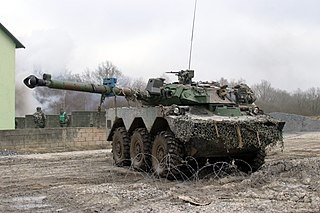 W
WThe AMX-10 RC is a reconnaissance vehicle built by GIAT. Over 240 are in service in the French Army. In addition, 108 vehicles were sold to Morocco and 12 to Qatar. RC stands for Roues-Canon, or wheeled gun.
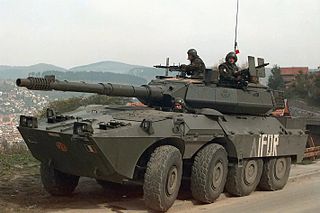 W
WThe Centauro is a family of Italian military vehicles originating from a wheeled tank destroyer for light to medium territorial defense and tactical reconnaissance. It was developed by a consortium of manufacturers, the Società Consortile Iveco Fiat - OTO Melara (CIO). Iveco Fiat was tasked with developing the hull and propulsion systems while Oto Melara was responsible for developing the turrets and weapon systems.
 W
WFV 4401 Contentious was a prototype British air-portable tank destroyer of the early 1960s. At least one prototype was constructed and tested, although no production vehicles were built or saw service.
 W
WThe FV102 Striker was the anti-tank guided missile carrier in the CVR(T) family and served in the British Army.
 W
WThe FV1620 Humber Hornet was a specialised air-deployable armoured fighting vehicle designed to carry the Malkara, an anti-tank guided missile developed by Australia and the United Kingdom.
 W
WThe IT-1 was a Soviet cold war missile tank based on the hull of the T-62. The tank fired specially designed 3M7 Drakon missiles from a pop-up launcher. It saw a very limited service between 1968 and 1970. The large deadzone around the tank created by the missiles' minimum range combined with the limited amount of ammunition carried made it unpopular with the military. Also, the 520 kg of guidance equipment needed for the missile was impractical. Eventually, the tanks were converted into recovery vehicles. A turbine-powered version was also developed named the IT-1T.
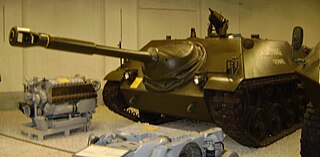 W
WThe Jagdpanzer MOWAG Cheetah is a Jagdpanzer made by Mowag in Switzerland.
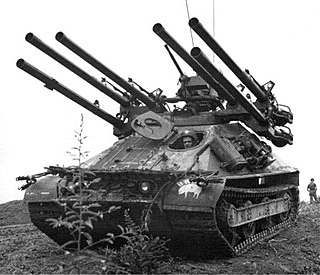 W
WOntos, officially the Rifle, Multiple 106 mm, Self-propelled, M50, was a U.S. light armored tracked anti-tank vehicle developed in the 1950s.
 W
WThe M56 Scorpion is an American unarmored, airmobile self-propelled tank destroyer, which was armed with a 90mm M54 gun with a simple blast shield, and an unprotected crew compartment.
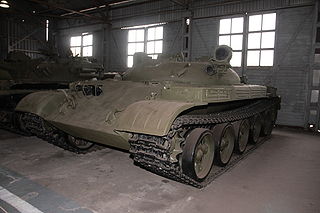 W
WA missile tank is an armoured fighting vehicle fulfilling the role of a main battle tank, but using only guided missiles for main armament. Several nations have experimented with prototypes, notably the Soviet Union during the tenure of Nikita Khrushchev, but only the West German Jaguar 2 saw service as a standard vehicle, although the Soviet IT-1 missile tank also saw limited service.
 W
WThe Nahkampfkanone 1 was an experimental Swiss tank destroyer that saw service between 1944 and 1947. Only one was ever built.
 W
WNahkampfkanone 2 is a prototype tank destroyer of Swiss design.
 W
WThe Norwegian Model-142 is an anti-tank variant of the American M-113 armoured personnel carrier (APC), the difference being that it is equipped with a TOW2 turret developed in Norway by Kværner Eureka.
 W
WObject 775 was a Soviet experimental missile tank built in 1964.
 W
WThe Pereh is an Israeli guided missile carrier, disguised as a tank. Serving the Israel Defense Forces in the role of precision artillery since the mid 1980s, the existence and nature of the vehicle was kept classified until declassification in June 2015.
 W
WThe Rooikat is a South African armoured reconnaissance vehicle equipped with a stabilised 76mm high velocity gun for organic anti-tank and fire support purposes. It is capable of giving the same performance and using the same ammunition as the Oto Melara 76 naval gun, albeit with new percussion primers.
 W
WThe SU-14 was a prototype Soviet heavy self-propelled gun built on a T-35 chassis. The original prototype mounted a 152 mm gun M1935 (Br-2); the SU-14-1 variant of 1936 carried a 203 mm gun B-4 which could fire 48.9 kilogram shells at ranges up to 25 km. Its armour was 20 to 50 mm thick. It never entered serial production.
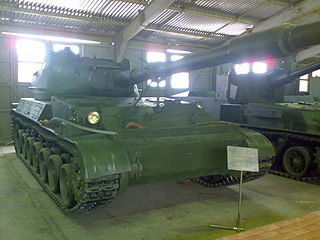 W
WThe Object 120 SU-152 "Taran" was a fully enclosed Soviet tank destroyer built in 1965, that never progressed past the experimental stage.
 W
WThe Type 16 maneuver combat vehicle is a wheeled armored fighting vehicle of the Japan Ground Self-Defense Force.
 W
WThe Type 60 Self-propelled 106 mm Recoilless Gun is a light anti-tank vehicle developed by Japan in the late 1950s. It mounts two M40 106 mm recoilless rifles as its main armament.
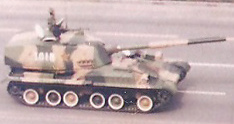 W
WThe Type 89 tank destroyer is a Chinese armored, tracked, tank destroyer vehicle developed by Norinco for the People’s Liberation Army. The vehicle was developed in the 1980s and entered service in 1988.
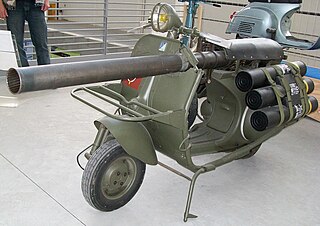 W
WThe Vespa 150 TAP was an anti-tank scooter made in the 1950s from a Vespa scooter for use with French paratroops. Introduced in 1956 and updated in 1959, the scooter was produced by Ateliers de Construction de Motocycles et Automobiles (ACMA), the licensed assembler of Vespas in France at the time. Modifications from the civilian Vespa included a reinforced frame and a three-inch recoilless rifle mounted to the scooter.
 W
WThe Versuchsträger 1-2 were two German prototype twin gun turretless main battle tanks. Since the early 1970s a number of West German companies have been working on conceptual designs for a successor to the Leopard 1. This project had the name Kampfpanzer 3. The KPz 3 project was temporarily a British-German joint project, until the UK withdrew because they wanted a turreted tank. The Germans had already developed the Leopard 2 and therefore didn't see the need for another conventional tank. One of the companies involved was MaK, developing the VT 1-1 and VT 1-2. The test programme ended proving that a twin-gunned turretless tank could be created with enough technical effort, but had drawbacks in both practical and tactical use.